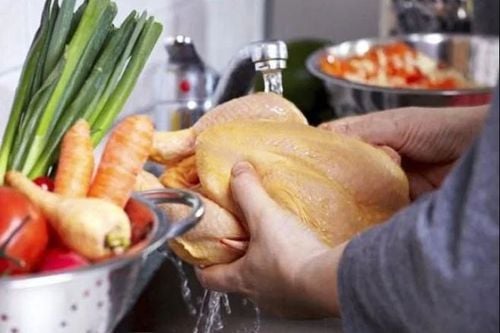This is an automatically translated article.
When it comes to European meals, the idea of bacon seems to be popular with many extremely attractive dishes. However, many people still wonder if eating bacon is good or how to cook it properly?
1. How is bacon made?
Depending on the manufacturer and proprietary recipe, there are different bacon products. For the most part, bacon is made from pork; you can also find similar products from turkey . The meat is soaked in a solution of salt, nitrate and sugar, and then smoked. The salt and nitrate environment has limited the ability of bacteria to penetrate and grow, prolonging the shelf life of the product. Although cooking and smoking are ways to preserve meat, these methods contribute to the distinctive flavor of bacon and help preserve its red color.

Ăn thịt xông khói như thế nào là câu hỏi được nhiều người quan tâm
2. Nutritional value of bacon
To answer the question of whether eating bacon is fatty, we first need to look at the nutritional content studied in this food. Overall, just like classic meats, bacon is also packed with nutrients. A 100-gram serving of cooked bacon contains:
140 calories (equivalent to one cup of low-fat milk or two small slices of whole-wheat bread) 37 grams of high-quality animal protein Vitamins B1, B2, B3, B5, B6 and B12 89% of the RDA (recommended daily intake) for selenium 53% of the RDA for phosphorus A generous dose of the minerals iron, magnesium, zinc and potassium To save time, with the above bacon comes with pieces A sandwich or a few baked potatoes can meet your nutritional needs for breakfast. People tend to think of eating bacon as a fresh piece of meat, like a pork chop or a steak. In fact, all the nutrients found in bacon are also found in other, less processed pork products.

Ăn thịt xông khói ở mức vừa phải do có hàm lượng các chất dinh dưỡng cao
3. Is eating bacon good?
Currently, to answer the question of whether eating bacon is good or not, there are mixed opinions. In which, not so positive information about the impact of bacon seems to be the majority.
In October 2015, the International Agency for Research on Cancer, part of the World Health Organization, named processed meats – including bacon – a “group 1 carcinogen”. This means that there is enough evidence to suggest that eating these foods can cause colon or stomach cancer or are linked to pancreatic and prostate cancer. Nitrates, commonly used as a preservative in processed meat, convert to N-nitroso (a cancer-promoting compound) in the meat and also in the intestines as it is digested. Carcinogenic PAHs (polycyclic aromatic hydrocarbons) can be generated during processing.
Not only that, the ingredients in bacon also have negative effects such as:
Bacon is high in fat
The fat content in bacon is up to 50% monounsaturated fat and a large part of it is oleic acid. After that, about 40% is saturated fat, along with a small amount of cholesterol. The cholesterol in every 100 grams of bacon from pork ranges from 22 to 30 milligrams, and from turkey it ranges from 30 to 40 milligrams. Many studies suggest that cholesterol in your daily diet often affects your blood cholesterol levels. Besides, many medical experts believe that consuming a lot of saturated fat is the main cause of problems related to heart disease, stroke. Generally, the health effects of saturated fat can depend on the type of fat, a person's diet, and overall lifestyle. The American Heart Association recommends limiting saturated fat to less than 7% of total calories (that's less than 16 grams of saturated fat for someone eating 2,000 calories per day). In fact, you shouldn't worry too much about bacon's high fat content, as servings are typically small, infrequent.
Bacon contains a lot of salt
Because salt is used in the processing and preservation process, bacon has a fairly high salt content. The amount of sodium (component of the salt molecule) in 100 grams of bacon ranges from 420 to 600 milligrams, and chicken bacon is 280 to 360 milligrams. According to nutritionists, eating foods high in salt often increases the risk of stomach cancer and high blood pressure in people who are sensitive to salt. Although high blood pressure is harmful in the long run, there is no clear link between salt intake and death from heart disease.
Content of Nitrate, Nitrite and Nitrosamine
Processed meat in general or bacon in particular often contains additives such as nitrates and nitrites. When cooked at high temperatures, they form compounds called nitrosamines, which are known carcinogens. However, antioxidants such as vitamin C and erythorbic acid, which are added during the curing process, are able to effectively reduce the nitrosamine content of bacon. Given these effects, today's bacon is processed to contain much less nitrosamines than in the past, but scientists are still concerned that eating too much could increase cancer risk.
Other Potentially Harmful Compounds
If you use too much heat and burn the meat, it will form harmful compounds like polycyclic aromatic hydrocarbons and heterocyclic amines, which have been linked to cancer. On the other hand, some types of bacon, if not properly prepared and stored, can contain pathogens such as bacteria, viruses, and parasites.
For this reason, the right way to eat bacon is when you cook it just right, at the right time.
If you are a real bacon lover, cut back on other processed meats to keep your total processed meat consumption low.
If you have any questions related to the topic of nutrition for the body that need advice from a doctor, you can leave your question in the ASK VINMEC DOCTOR section directly on the hospital website. Your question will be sent to the doctor and you will receive a consultation as soon as possible!
Please dial HOTLINE for more information or register for an appointment HERE. Download MyVinmec app to make appointments faster and to manage your bookings easily.
References: webmd.com, healthline.com













